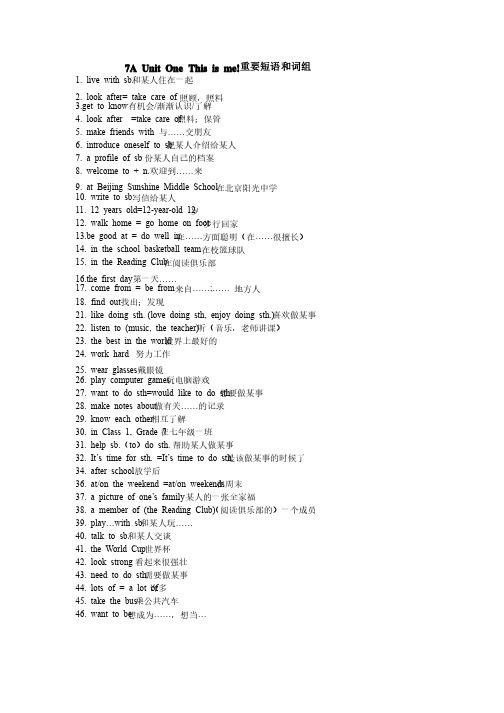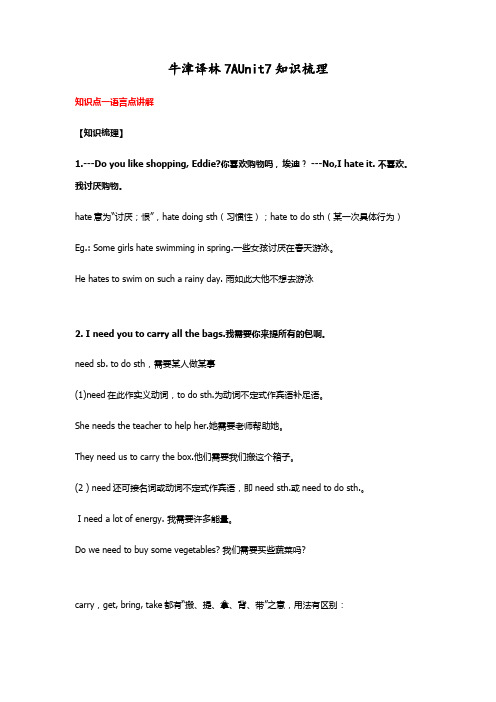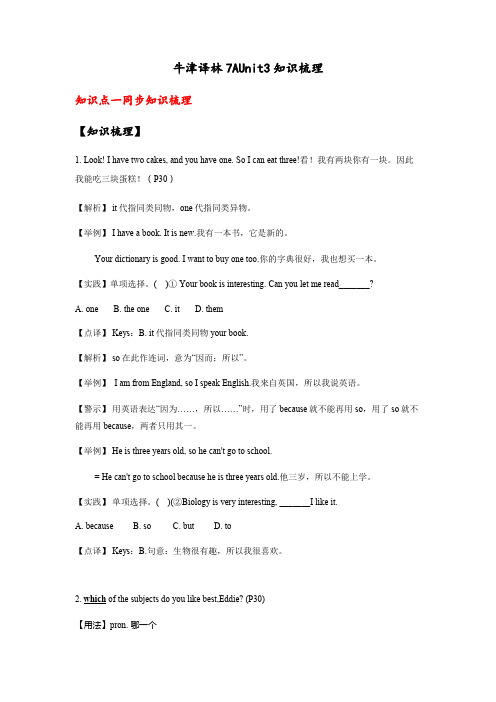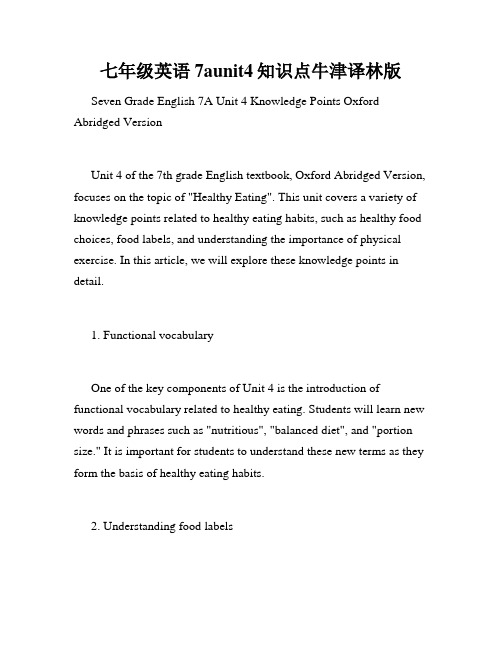牛津译林版七年级英语7A 期末复习知识点归纳
译林版牛津初中英语7A一至四单元的重要词组、句型

7A Unit One This is me!重要短语和词组 1. live with sb. 和某人住在一起和某人住在一起2. look after= take care of 照顾,照料照顾,照料3.get to know 有机会有机会/渐渐认识/了解了解4. look after =take care of 照料;保管照料;保管5. make friends with 与……交朋友交朋友6. introduce oneself to sb 把某人介绍给某人把某人介绍给某人7. a profile of sb 一份某人自己的档案一份某人自己的档案8. welcome to + n. 欢迎到……来9. at Beijing Sunshine Middle School 在北京阳光中学在北京阳光中学 10. write to sb. 写信给某人写信给某人11. 12 years old=12-year-old 12岁12. walk home = go home on foot 步行回家步行回家13.be good at = do well in 在……方面聪明(在……很擅长)很擅长)14. in the school basketball team 在校篮球队在校篮球队15. in the Reading Club 在阅读俱乐部在阅读俱乐部16.the first day 第一天第一天……17. come from = be from 来自……;…… 地方人地方人18. find out 找出;发现找出;发现找出;发现 21. like doing sth. (love doing sth, enjoy doing sth.) 喜欢做某事喜欢做某事22. listen to (music, the teacher) 听(音乐,老师讲课)听(音乐,老师讲课)23. the best in the world 世界上最好的世界上最好的24. work hard 努力工作努力工作25. wear glasses 戴眼镜戴眼镜戴眼镜 26. play computer games 玩电脑游戏玩电脑游戏玩电脑游戏 27. want to do sth=would like to do sth. 想要做某事想要做某事28. make notes about 做有关……的记录的记录29. know each other 相互了解相互了解30. in Class 1, Grade 7 在七年级一班在七年级一班31. help sb. (to )do sth. 帮助某人做某事帮助某人做某事32. It’s time for sth. =It’s time to do sth. 是该做某事的时候了是该做某事的时候了34. after school 放学后放学后放学后 36. at/on the weekend =at/on weekends 在周末在周末37. a picture of one’s family 某人的一张全家福某人的一张全家福38. a member of (the Reading Club) (阅读俱乐部的)一个成员(阅读俱乐部的)一个成员39. play…with sb.和某人玩…… 40. talk to sb. 和某人交谈和某人交谈41. the World Cup 世界杯世界杯42. look strong 看起来很强壮看起来很强壮43. need to do sth. 需要做某事需要做某事44. lots of = a lot of 许多许多45. take the bus 乘公共汽车乘公共汽车46. want to be 想成为想成为……,想当…Unit 2 Let’s play sports 重要短语和词组1. Let’s play sports 让我们进行体育运动吧让我们进行体育运动吧2. Do you like any sports? 你喜欢运动吗?你喜欢运动吗?3. like walking 喜欢散步喜欢散步4. Really? 真的吗真的吗5. walk to my bowl 走到我的碗边走到我的碗边6. many times a day 一天许多次一天许多次7. play volleyball 打排球打排球8. play tennis 打网球打网球9. play football 踢足球踢足球 10. enjoy swimming 喜欢游泳喜欢游泳喜欢游泳 11. What’s your favorite sport? 你最喜欢的运动是什么?你最喜欢的运动是什么?12. like doing sth 喜欢作某事喜欢作某事13. after school 放学以后放学以后14. what about you ?=How about you? 你怎么样?你怎么样?15. go swimming 去游泳去游泳16. every week 每周每周17. love sports 爱运动爱运动18 .very much 非常非常19. my favorite football player/star 我特别喜爱的足球运动员/明星明星20. 22 years old 22岁21. a new member of 一名新成员一名新成员2.2 Huanghe Football Club 黄河足球俱乐部黄河足球俱乐部23. come from Guangdong 来自广东来自广东24. live in Beijing 住在北京住在北京25. look strong 看上去很壮看上去很壮26. play football very well 足球踢得好足球踢得好27. in his free time 在他空余时间在他空余时间28. study English 学英语学英语29. enjoy listening to music 喜欢听音乐喜欢听音乐30. make sb happy 使某人开心使某人开心 make sb feel great使某人感觉棒 31. want to do sth =would like to do sth 想做某事想做某事32. play in the next World Cup 踢进下次世界杯踢进下次世界杯33. hope his dream comes true 希望他梦想成真希望他梦想成真34. a lot of interesting books 许多有趣的书许多有趣的书35. get up 起床起床36. watch ball games/matches 看球赛看球赛37. after-school activities 课外活动课外活动课外活动 38. . my hero 我的偶像。
7A 译林牛津版Unit1-4重点词组和句型

7A U n i t1重点词组和句型复习一、重点词组1、一只电子狗an e-dog2、这只狗的主人themasterofthedog/thedog’smaster3、看书readbooks4、见到你很高兴Nice/Gladtomeet/seeyou!5、欢迎来到七年级一班Welcometo Class One,Grade Seven6、在七年级inGrade77、十二岁twelveyearsold8、一个8/11岁的女孩an eight/eleven–year–oldgirl9、长着乌黑的长发havelongblackhair10、又高又苗条tallandslim11、喜欢阅读/游泳/跳舞/运动like/love/enjoydoingsth12、踢足球/打篮球/排球playfootball/basketball/volleyball13、玩电脑游戏playcomputergames14、玩球playwithaball15、课后/放学后afterclass/school16、来自befrom/comefrom17、擅长begoodat/dowellin(sth/doingsth)18、让我们来见见我的新同学Let’smeetmynewclassmates.19、和家人住在南京livewithmyfam ilyinNanjing20、戴眼镜wearglasses21、所有的功课allthelessons22、让某人做某事Letsbdosth二、重点句型lieisanewstudent at SunshineMiddleSchool.米莉是阳光中学的一名新学生。
SheisanewstudentatHuaiyinMiddleSchool.2.Ihaveshorthair.=Myhairisshort.我长着短发。
Shehaslonghair.=Herhairislong.3.He isfrom Nanjing.=He comesfrom Nanjing.他来自南京。
牛津译林7AUnit7知识梳理

牛津译林7AUnit7知识梳理知识点一语言点讲解【知识梳理】1.---Do you like shopping, Eddie?你喜欢购物吗,埃迪? ---No,I hate it. 不喜欢。
我讨厌购物。
hate意为“讨厌;恨”,hate doing sth(习惯性);hate to do sth(某一次具体行为)Eg.: Some girls hate swimming in spring.一些女孩讨厌在春天游泳。
He hates to swim on such a rainy day. 雨如此大他不想去游泳2. I need you to carry all the bags.我需要你来提所有的包啊。
need sb. to do sth,需要某人做某事(1)need在此作实义动词,to do sth.为动词不定式作宾语补足语。
She needs the teacher to help her.她需要老师帮助她。
They need us to carry the box.他们需要我们搬这个箱子。
(2 ) need还可接名词或动词不定式作宾语,即need sth.或need to do sth.。
I need a lot of energy. 我需要许多能量。
Do we need to buy some vegetables? 我们需要买些蔬菜吗?carry,get, bring, take都有“搬、提、拿、背、带”之意,用法有区别:(1)carry强调动作的移动性,不强调方向He often carries water for the old man.他经常帮老人提水。
(2)get意为“拿,取”指从说话人所在地出发,把人或物带回原处,表示动作的往返,如:Can you get me some water?你能帮我取点水吗?(3)bring意为“拿来,带来”,指把某物或某人从别处带到说话者所在的地方,动作由远及近。
初中英语 牛津译林版7A Unit1-Unit8语法汇总

7A U1-U8语法汇总动词三单形式的变化规则用法:be动词,情态动词,助动词之后;行为动词之前提问:How oftenU5 特殊疑问句:特殊疑问词+一般疑问句?特殊疑问词:【what】”什么”➡是什么,叫什么,做什么可对主语,宾语,动作进行提问【when】“什么时候”询问时间,在询问具体时间,即“几点几分”,相当于“what time”【where】“在哪里”,用来询问地点,句中的不及物动词后不要加介词。
Where does Mr.Li live?【which】“哪一个,哪一些”,用来询问人或物,常构成“which +名词”结构或单独做句子的主语。
【who】“谁”,询问人【whose】“谁的”,既可用作形容词性物主代词,也可用作名词性物主代词。
Whose book is this?=Whose is this book?感叹句:What (a/an)+形容词+名词(+主语+谓语)!What a beautiful girl (she is)!How+形容词+the+主语+谓语!How beautiful the girl is!/基数词+量词+of+不可数名词”来表达a piece of bread一片面包 a glass of water一杯水a plate of chicken一盘鸡two bags of rice两袋米three cups of tea三杯茶◎复合名词变为复数时,一般只把主要名词变为复数:apple tree--apple trees与man,woman相关的复合名词变复数时,前后名词都要变成复数:woman teacher-women teachersU7 some&any there be句型◎there be句型:表达某地有某人或某物►肯定句T here be+名词(+地点状语)eg;There is some rice in the bowl.►否定句T here be+not +名词(+地点状语)eg;There aren’t any apples on the tree.►一般疑问句B e there+名词(+地点状语)?肯定回答:Yes,there be. 否定回答:No,there be not.eg:--Is there a big tree near the house. --Yes, there is./No, there isn’t.►特殊疑问句特殊疑问词+名词+be there (+地点状语)eg:How many boxes are there in the room?☑There is 可数名词单数/ 不可数名词☑There are 可数名词复数★【就近原则】There be 后面接多个名词时,be动词的形式取决于最靠近be动词的名词数【There be & have】There be 表示“某人或某物存在于某地”Have 表示“某人或某物拥有某东西”,强调所属关系※对there be句型的主语(名词)提问,要用‘what is+地点状语’,无论原句主语时单数还是复数,提问时be动词只能用is,回答时要根据具体情况而定。
牛津译林版英语7A-Unit1-This-is-me!-知识归纳与拓展

7A Unit1 知识归纳与拓展【词汇解析】1.gradegrade作名词,意为“年级”。
指年级时,多以短语形式出现:“Grade+基数词”,首字母要大写。
如:八年级Grade Eight/Grade 8。
也可用“the+序数词+grade”。
另外,grade 还有“成绩”的意思。
M y brother is in Grade Two.=My brother is in the second grade.我弟弟上二年级。
All the students get good grades.所有的学生都获得了好成绩。
2.be good at(doing)sth.be good at(doing)sth.意为“擅长(做)某事”。
at是介词,后接名词或动词一ing形式。
Is your sister good at:dancing? 你姐姐擅长跳舞吗?3.swimmingswimming作名词,意为“游泳;游泳运动”。
其构成是由动词swim双写最后一个辅音字母,然后加上后缀一ing变来的。
许多动词都可以变成一ing形式作名词使用。
Tom likes running.汤姆喜欢跑步。
Jerry and Mary like singing.杰瑞和玛丽喜欢唱歌。
Reading is good for students.阅读对学生们有益。
4.ageage为名词,意思是“年龄”,如果指多少岁,可以用“基数词+year(s)+old”。
His age is 12.他12岁了。
He is twelve years old.他12岁了。
What is the age of the bridge? 这座桥有多久的历史了?5.everyoneeveryone为代词,意为“每人,人人”,作主语时,谓语动词必须用单数形式。
everyone 是一个词,只用来指人,后面不能跟介词of;every one是两个词,既可用来指人,也可用来指物,后面可跟介词of。
牛津译林7AUnit3知识梳理

牛津译林7AUnit3知识梳理知识点一同步知识梳理【知识梳理】1. Look! I have two cakes, and you have one. So I can eat three!看!我有两块你有一块。
因此我能吃三块蛋糕!(P30)【解析】 it代指同类同物,one代指同类异物。
【举例】 I have a book. It is new.我有一本书,它是新的。
Your dictionary is good. I want to buy one too.你的字典很好,我也想买一本。
【实践】单项选择。
( )① Your book is interesting. Can you let me read_______?A. oneB. the oneC. itD. them【点译】 Keys:B. it代指同类同物your book.【解析】 so在此作连词,意为“因而;所以”。
【举例】 I am from England, so I speak English.我来自英国,所以我说英语。
【警示】用英语表达“因为……,所以……”时,用了because就不能再用so,用了so就不能再用because,两者只用其一。
【举例】 He is three years old, so he can't go to school.= He can't go to school because he is three years old.他三岁,所以不能上学。
【实践】单项选择。
( )(②Biology is very interesting, _______I like it.A. becauseB. soC. butD. to【点译】 Keys:B.句意:生物很有趣,所以我很喜欢。
2. which of the subjects do you like best,Eddie? (P30)【用法】pron. 哪一个【举例】It's hard to say which is better.很难说哪一个好些。
七年级英语7aunit4知识点牛津译林版

七年级英语7aunit4知识点牛津译林版Seven Grade English 7A Unit 4 Knowledge Points Oxford Abridged VersionUnit 4 of the 7th grade English textbook, Oxford Abridged Version, focuses on the topic of "Healthy Eating". This unit covers a variety of knowledge points related to healthy eating habits, such as healthy food choices, food labels, and understanding the importance of physical exercise. In this article, we will explore these knowledge points in detail.1. Functional vocabularyOne of the key components of Unit 4 is the introduction of functional vocabulary related to healthy eating. Students will learn new words and phrases such as "nutritious", "balanced diet", and "portion size." It is important for students to understand these new terms as they form the basis of healthy eating habits.2. Understanding food labelsAnother important knowledge point covered in this unit is how to read food labels. Students will learn how to identify the different types of nutrients, such as fat, salt, and sugar, and how to understand their measurements. By being able to read food labels, students can make informed decisions about their food choices.3. Healthy food choicesUnit 4 also covers the importance of making healthy food choices. Students will learn about the food groups, such as fruits and vegetables, carbohydrates, proteins, and fats, and the essential nutrients found in each group. By understanding the importance of a balanced diet and the nutrients required for healthy living, students can make better food choices.4. Exercise for a healthy lifestyleFinally, Unit 4 emphasizes the importance of physical exercise for a healthy lifestyle. Students will learn about the different types of exercise and their benefits, such as cardio, strength training, and flexibility exercises. By understanding the different types of exercise and their benefits, students can make informed decisions about their physical activity.ConclusionUnit 4 of the 7th-grade English textbook, Oxford Abridged Version, covers a variety of knowledge points related to healthy eating habits and physical exercise. By understanding functional vocabulary, reading food labels, making healthy food choices, and incorporating physical activity into their daily routine, students can develop a healthy lifestyle. By following these knowledge points, students can maintain their physical and mental health and achieve greater success in their academic and personal lives.。
新牛津英语译林版7A各单元词汇及重点句型一览表

新牛津英语译林版7A各单元词汇及重点句型一览表Unit1 This is me.单词:1 oh /əʊ/ excl. 哦,啊2 e—dog /'i:dɒɡ/ n. 电子狗3 master /'mɑ:stə(r)/ n。
主人4 grade /ɡreɪd/ n. 年级5 student /ˈstju:dnt/n. 学生6 reading /’ri:dɪŋ/n。
阅读7 classmate /ˈklɑ:smeɪt/ n. 同班同学8 afterschool /ˈɑ:ftə sku:l/ 放学后9 slim /slɪm/ adj. 苗条的10 be good at /bi: ɡud æt/ 擅长于11 over there /’əʊvə(r) / /ðεə/ 在那边12 classroom /ˈklɑ:sru:m/ n。
教室13 dancing /'dɑ:nsɪŋ/n。
跳舞,舞蹈14 swimming /ˈswɪmɪŋ/n. 游泳15 age /eɪdʒ/ n。
年龄16 looks /lʊks/ n。
相貌,容貌17 cute /kju:t/ adj. 可爱的;讨人喜欢的18 hobby /'hɒbɪ/ n。
业余爱好19 glad /ɡlæd/ adj. 高兴地20 everyone /ˈevriwʌn/ pron.每人,人人21 comefrom /kʌm frɔm/ 来自22 glasses /’glɑ:sɪz/ n. 【复】眼镜句型:1.How to look after your e-dog.如何照顾你的电子狗。
2.I have short hair。
= My hair is short.我短发。
3.Let's meet my new classmates.让我们见见我的新同学。
4.She is tall and slim。
她高而苗条。
- 1、下载文档前请自行甄别文档内容的完整性,平台不提供额外的编辑、内容补充、找答案等附加服务。
- 2、"仅部分预览"的文档,不可在线预览部分如存在完整性等问题,可反馈申请退款(可完整预览的文档不适用该条件!)。
- 3、如文档侵犯您的权益,请联系客服反馈,我们会尽快为您处理(人工客服工作时间:9:00-18:30)。
牛津译林版七年级英语7A 期末复习知识点归纳7A 期末复习归纳之一——介副词介副词填空:1. We’ll have a big party _________ the evening of December 31st.2. Eating too much sugar is bad __________ our teeth.3. __________Christmas, people in the western countries have a big dinner.4. The shirt looks cool ___________ Jim.5. Jim looks great __________ this sweater.6. Could you lend your car _________ me?7. I want to borrow some money _________ you.8. I have to go _________ a big dinner this evening.9. My mum always gets everything ready _________ me in the morning.10. He usually has some bread and an egg ___________ breakfast.11. Would you like to buy some presents __________ your friends?12. Trainers and jeans are popular ___________ students.13. Trainers are fit ________ a long walk.14. I always think ___________ what to wear in the morning.15. Thank you _________ helping me a lot.16. I don’t have enough money __________ this pair of shoes.17. The boy plays football __________ two hours every day.18. An apple a day keeps the doctor ____________.19. Do you like to let __________ fireworks?20. I like this shirt. Can I try it __________?21. What ___________staying at home with us?22. I'm interested ________ collecting stamps.7A 期末复习归纳之二——动词形式用适当的动词形式填空:1. Thank you for ___________(design) a poster for me.2. We usually have a party ____________(celebrate) Christmas.3. The children like ___________(let) off fireworks at night.4. Do you need ___________(go) for the big dinner this evening?5. Who often__________(go) to your birthday party?6. What do you plan _________(do) at the weekend?7. Would you like ___________(exercise) with me every morning?8. Playing football every day helps me ___________(keep) fit.9. How much __________ this pair of shoes __________(cost)?10. I don’t have enough money _________(buy) the hair clips.11. Can you use your pocket money __________(help) the children in poor areas?12. The new cinema is a good place _________(watch) films.13. The trainers are ________(make) of leather.14. It’s time for dinner, but Simon ________________(lie) on the bed a nd watching TV.15. ----Where is Tim? ----He _________(study) in his bedroom.16. _________(eat) too much sugar is bad for your eyes.17. I don’t know where _________(go) now.18. She never_________(stay) here for more than one hour.19. ----__________ the scarf ____________(match) her sweater? ----Of course.20. There __________(be) a box of oranges in the room.21. What about ___________(visit) Nanjing Museum at the weekend?7A 期末复习归纳之三——易错题词汇:1. What is wrong with your father? He ___________(似乎) sad.2. ________(节日) like Christmas and Halloween are also popular in China now.3. Tom’s grandfather is always in good _______(健康), because he often does much exercise.4. We need six _____________(芒果)and ten _____________(西红柿).5. He often __________(收集) stamps in his free time.6. The place is one of the greatest _________(地区) in the world.7. This dress is too small. Please show me ____________(另一个) one.8. There are many colourful _________(围巾)in the gift shop.用所给单词的适当形式填空:1. My parents sometimes take my brother and ________(I) to the park.2. Who often __________(go) to your birthday dinner?3. How about _____________(paint) our faces? I think it’s really cool.4. There are some _________(tomato) in the fridge.5. It’s important for you __________(read) English in the morning.6. Would you like _________(buy) fish for supper?7. Eating more fruit and vegetables _______(be) good for us.8. She gives his son two _________(toy) trains.9. Millie, together with her friends ___________(dress) up as ghosts and animals.10. This pair of shoes _________(match) your red skirt.11. Don’t t alk. The students ______(listen)to the teacher.12. Please ___________(wait) for your turn now, Jack.13. ----________ he ___________(visit) Beijing now? ----No, he isn’t. He is in Shanghai.14. Look! There is a dog _________(lie) on the ground.单项选择:( ) 1. The girl _____________ a grey blouse and she wants to dress up as an old lady.A. inB. wearingC. put onD. dresses up in( ) 2. We always have a Christmas party _________ the morning of Christmas 25th.A. atB. inC. onD. before( ) 3. There is going to ____________ a class meeting this afternoon.A. haveB. /C. beD. has( ) 4. ----______________ do you do to celebrate Halloween?----We play a game called “trick or treat” on October 31st.A. WhatB. HowC. WhyD. Where( ) 5. Please __________ who broke the window. Tell your headteacher at once then.A. lookB. look forC. findD. find out( ) 6. ----Do you know _______the man is?----I hear he is much better these days. (2010南通)A. whatB. howC. whoD. where( ) 7. ----________ do you watch TV every week? (2011南京)----Less than two hours. I often have much homework to do.A. How manyB. How muchC. How longD. How often( ) 8. ----_______ is it to your home town from here? (2011无锡)----Well, it takes a little over three hours to get there by coach.A. How soonB. How muchC. How longD. How far( ) 9. His father and mother __________ teachers.A. both areB. all areC. are bothD. are all( ) 10. What do you often have _________ supper?A. forB. atC. toD. with( ) 11. There is ________”m” in the “woman”.A. aB. anC. /D. the( ) 12. You should be careful with your _________, because you are not ________.A. health; healthyB. healthy; healthC. health; healthD. healthy; healthy( ) 13. Don’t eat ____________sweets. There is __________ sugar in them.A. too much; too muchB. too many; too muchC. many too; much tooD. much too; too many( ) 14. ----___________ TV do you watch every day? ----Less than an hour.A. How longB. How manyC. How muchD. How often( ) 15. Jack never does morning _____________ and he really needs to do more __________.A. exercise; exerciseB. exercises; exercisesC. exercises; exerciseD. exercise; exercises( ) 16. The roast chicken tastes __________. Would you like some?A. niceB. wellC. badD. badly( ) 17. The CD costs ________. I don’t want to buy it.A. expensiveB. highC. muchD. many( ) 18. ----______ beautiful day! Let’s go shopping together.----Good idea.A. HowB. WhatC. How aD. What a( ) 19. There ____________ some paper cups and four knives on the table.A. isB. areC. hasD. have( ) 20. I’m sure this kind of jeans _______ cool _______ anyone.A. looks; inB. look; onC. look; inD. looks; on( ) 21. ----How much do you ________ on all the things? ----About 300 yuan.A. costB. buyC. spendD. take( ) 22. The little boy _______ a pair of blue shorts is my cousin.A. is wearingB. withC. inD. puts on( ) 23. Dad, my trousers are old. I want to buy a new _______________.A. trousersB. oneC. itD. pair( ) 24. Don’t carry the box. You are not __________.A. enough strongB. strong enoughC. enough weakD. weak enough( ) 25. Where do your parents work? __________ of them work in a middle school.A. EachB. BothC. AllD. Every 句型转换:1. The boy under the tree is Jonson.__________________ is Jonson?2. There is a book in the school bag._______________ in the school bag?3. We must buy some presents because Christmas is coming._______________ some presents?4. She dances for two hours every day. (改为同义句)She ____________ two hours __________ every day.5. He eats noodles three times a week.____________ does he ______________noodles?6. People around the world celebrate New Year in many ways.___________people around the world celebrate New Year?7. I pay 10 yuan for the book.The book ________________ 10 yuan.8. How much is this pair of hair clips?How much _________ this pair of hair clips _____________?9. What do you think of my red scarf?_________do you ________ my red scarf?10. Blue jeans look nice on Daniel.Daniel ______________ nice _________ blue jeans.翻译句子:1. 春节期间孩子们喜欢放焰火。
